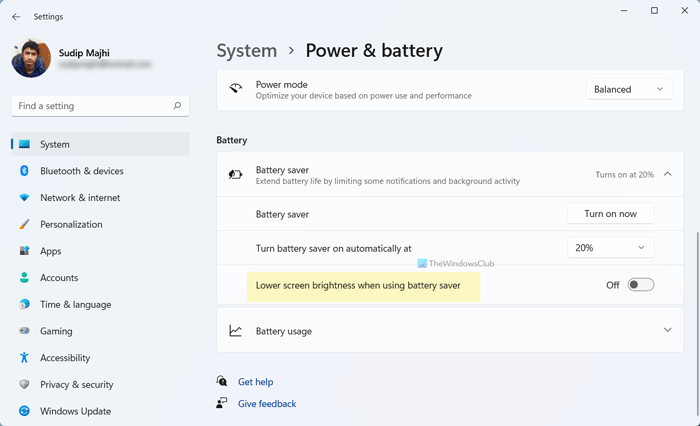Windows 11 or Windows 10 reduces the brightness of your screen when you turn on the Battery Saver on your computer. However, if you want to prevent Windows 11 from decreasing brightness when using Energy or Battery Saver, here is how you can do that. You can disable the brightness adjustment with the help of Windows Settings.
Energy or Battery Saver helps you get more backup than usual when your laptop is on battery. It reduces the number of the background process, disables background synchronization, etc. Apart from these, it decreases the screen brightness so that your laptop consumes less battery all the time.
Let’s assume that you want to turn on the battery saver but want to continue having the same brightness for some reason. You have only one option now – you need to use the Windows Settings. Windows 11 comes with an in-built option you can find in Windows Settings, which prevents your computer from reducing the screen brightness when you enable Battery Saver.
Prevent Windows from decreasing brightness when using Battery Saver
To prevent Windows 11/10 from decreasing brightness when using Energy or Battery Saver, follow these steps:
- Press Win+I to open Windows Settings on your PC.
- Ensure that you are in the System tab.
- Click on the Power & battery menu on the right-hand side.
- Expand the Battery saver section on the right side.
- Toggle the Lower screen brightness when using battery/energy saver button to turn it off.
You need to open the Windows Settings on your computer to get started. Although there are many methods to open it, you can use the keyboard shortcut, Win+I. After that, it is mandatory to ensure that you are in the System tab.
Following that, click on the Power & battery menu on the right-hand side. After that, head to the Battery section and click on the Battery saver section to expand it.
Here you can find a setting called Lower screen brightness when using battery saver or Lower screen brightness when using energy saver. By default, it is turned on. You need to toggle the corresponding button to turn it off.

Your computer won’t reduce the brightness level when you turn on the Battery saver on your PC from now on.
If you want to revert the change in the future, you need to open Windows Settings, go to System > Power & battery.
Then, expand the Battery saver section, and toggle the Lower screen brightness when using Energy or Battery Saver button to turn it on.
How do I stop my brightness from changing when I unplug the battery?
To stop the brightness from changing when you enable or disable the battery saver in Windows 11, you need to turn on or off a setting in Windows Settings. For that, press Win+I to open Windows Settings and go to System > Power & battery. Then, expand the Battery saver section, and toggle the Lower screen brightness when using battery saver button to turn it on or off.
Is it good to keep the Battery Saver on all the time?
Although battery saver saves a lot of battery power, it is not recommended to keep the battery saver on all the time. It helps you save battery power, but there are a lot of consequences. For example, it stops all kinds of background synchronizations. That said, you cannot upload or download files through any cloud storage service, such as Google Drive, OneDrive, etc. Apart from that, it disables a lot of background processes and services, making several programs half-baked when it requires background data synchronization.
I hope this guide helped you prevent your Windows 11 or Windows 10 computer from decreasing the screen brightness when you turn on the battery saver.
Leave a Reply